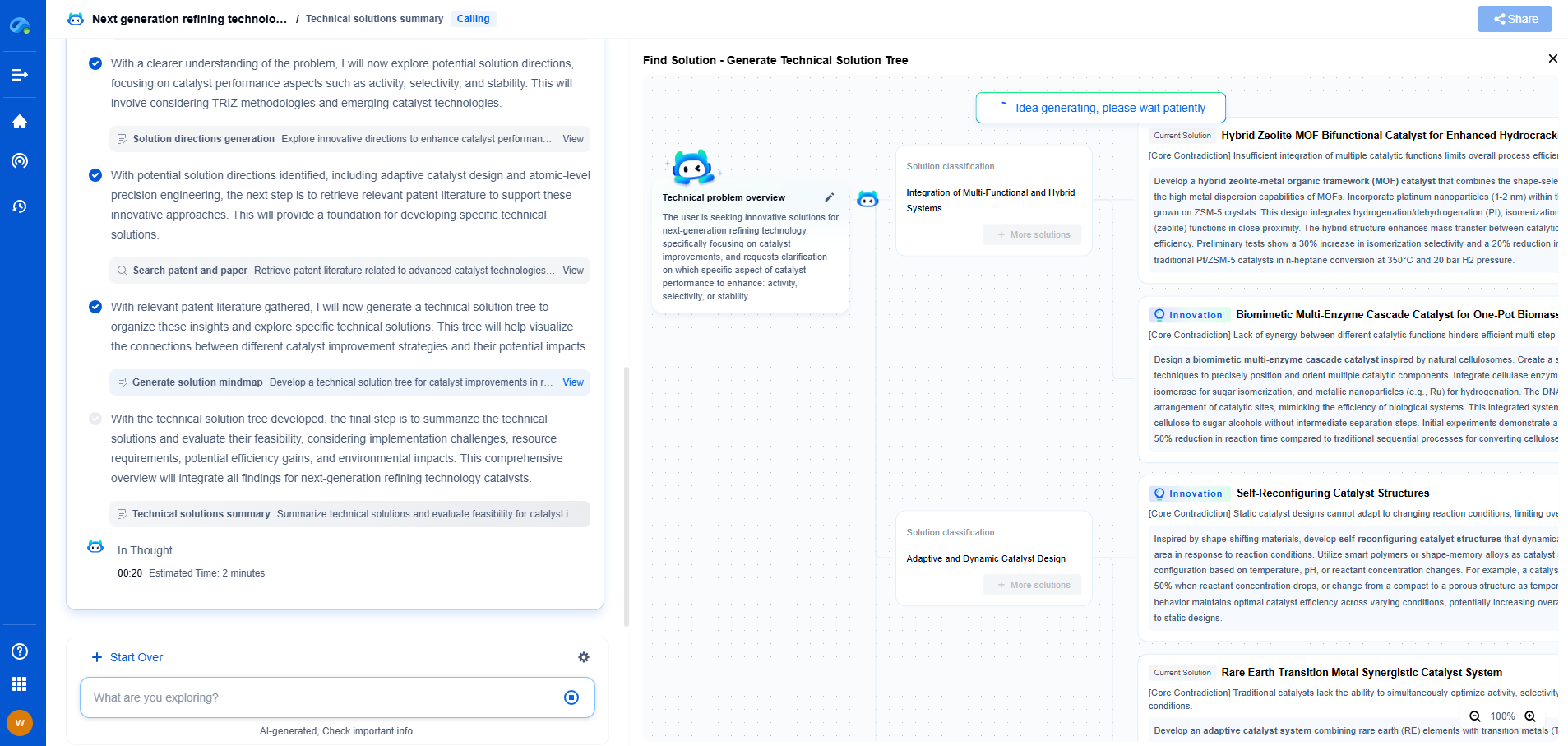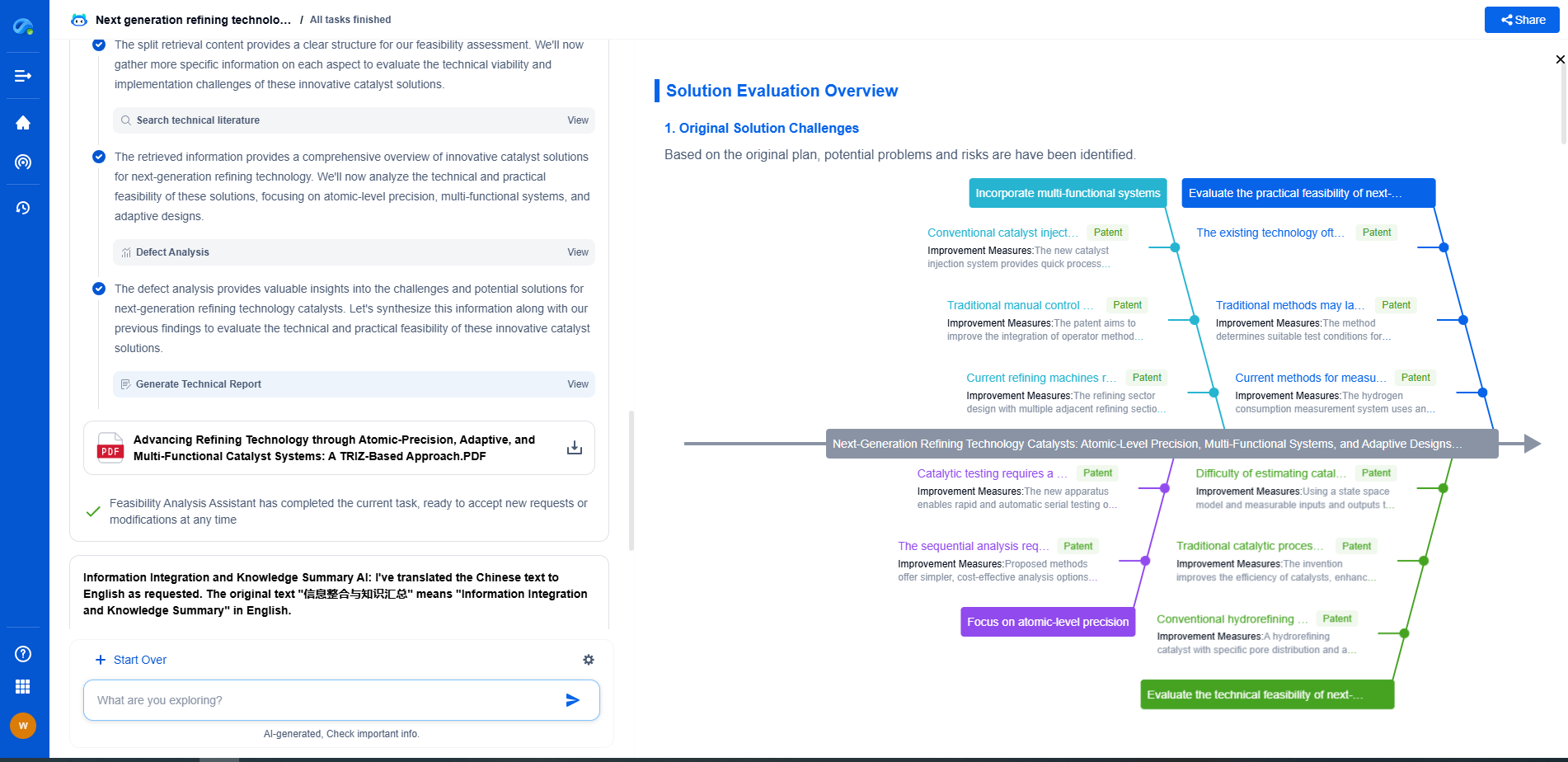Supercapacitors vs. Lithium Batteries: Which Is Better for Energy Storage?
JUL 9, 2025 |
In the rapidly advancing world of technology, energy storage solutions are critical for powering everything from small electronic devices to large-scale renewable energy systems. Two of the most discussed technologies in this area are supercapacitors and lithium batteries. Each has its unique advantages and disadvantages, making them suitable for different applications. In this blog, we will explore the characteristics, benefits, and limitations of these two energy storage solutions to help determine which might be better suited for specific needs.
Understanding Supercapacitors
Supercapacitors, also known as ultracapacitors, are energy storage devices that store energy through electrostatic fields rather than through chemical reactions. This fundamental difference provides supercapacitors with several distinct characteristics.
1. **High Power Density**
One of the most significant advantages of supercapacitors is their high power density. They can deliver energy quickly, making them ideal for applications that require bursts of power, such as regenerative braking systems in vehicles or backup power supplies in electronic devices.
2. **Rapid Charging and Discharging**
Supercapacitors charge and discharge much faster than lithium batteries. This capability is beneficial for applications that need frequent cycling, as it reduces downtime and increases efficiency.
3. **Longevity and Durability**
Supercapacitors have a longer lifecycle compared to lithium batteries. They can endure millions of charge and discharge cycles without significant degradation, making them highly durable and reliable over time.
4. **Environmentally Friendly**
Due to their simpler construction and lack of hazardous materials, supercapacitors are generally more environmentally friendly than lithium batteries and easier to recycle.
Limitations of Supercapacitors
Despite their benefits, supercapacitors have some limitations. They have a lower energy density than lithium batteries, meaning they cannot store as much energy in the same amount of space. This makes them less suitable for applications where long-term energy storage is a priority. Additionally, supercapacitors can be more expensive than lithium batteries, particularly for large-scale storage solutions.
Exploring Lithium Batteries
Lithium batteries have been the dominant choice for energy storage in consumer electronics, electric vehicles, and renewable energy storage systems. They operate by storing energy chemically, which gives them unique characteristics.
1. **High Energy Density**
Lithium batteries boast a high energy density, allowing them to store more energy in a compact size. This makes them ideal for applications where space is limited, such as in smartphones, laptops, and electric vehicles.
2. **Prolonged Energy Storage**
Lithium batteries are better suited for applications requiring long-term energy storage due to their ability to hold a charge over extended periods. This feature is essential for applications like grid energy storage and off-grid power systems.
3. **Mature Technology**
The technology behind lithium batteries is well-developed, leading to widespread availability and relatively lower costs compared to newer technologies like supercapacitors.
Limitations of Lithium Batteries
Lithium batteries, while effective, come with their drawbacks. They have a limited number of charge and discharge cycles before performance begins to degrade. Moreover, they can be sensitive to temperature fluctuations and overcharging, which can result in safety risks such as overheating or even fires. Additionally, the production and disposal of lithium batteries pose environmental concerns due to the materials involved.
Comparative Analysis: Supercapacitors vs. Lithium Batteries
When choosing between supercapacitors and lithium batteries, the decision largely depends on the specific requirements of the application.
1. **Application Needs**
If the application requires rapid energy delivery and frequent cycling, supercapacitors may be the better choice due to their high power density and longevity. However, for applications needing compact, long-term energy storage, lithium batteries are preferable due to their high energy density.
2. **Cost Considerations**
While supercapacitors can be more expensive to implement initially, their long lifecycle may offer cost savings over time, especially in high-cycle applications. Conversely, lithium batteries may present a more economical option upfront but may require more frequent replacements.
3. **Environmental Impact**
For those prioritizing environmental impact, the choice may lean toward supercapacitors given their more sustainable end-of-life disposal and lower environmental footprint during production.
Conclusion
Ultimately, neither supercapacitors nor lithium batteries can be deemed universally "better" for all energy storage needs. Each technology has its own set of strengths and weaknesses that make it more or less suitable for different applications. By understanding the specific requirements and constraints of your energy storage needs, you can make an informed decision on which technology is the most appropriate choice. As both technologies continue to advance, innovative solutions that combine the strengths of both supercapacitors and lithium batteries may emerge, further enhancing our capacity to store and utilize energy efficiently.
Looking to accelerate your capacitor innovation pipeline?
As capacitor technologies evolve—from miniaturized MLCCs for smartphones to grid-scale energy storage devices—so must the way your team accesses critical knowledge.
Patsnap Eureka, our intelligent AI assistant built for R&D professionals in high-tech sectors, empowers you with real-time expert-level analysis, technology roadmap exploration, and strategic mapping of core patents—all within a seamless, user-friendly interface.
Try Patsnap Eureka now and discover a faster, smarter way to research and innovate in capacitor technology.
- R&D
- Intellectual Property
- Life Sciences
- Materials
- Tech Scout
- Unparalleled Data Quality
- Higher Quality Content
- 60% Fewer Hallucinations
Browse by: Latest US Patents, China's latest patents, Technical Efficacy Thesaurus, Application Domain, Technology Topic, Popular Technical Reports.
© 2025 PatSnap. All rights reserved.Legal|Privacy policy|Modern Slavery Act Transparency Statement|Sitemap|About US| Contact US: help@patsnap.com

